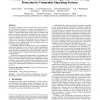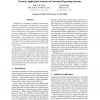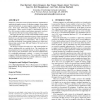152
click to vote
ASPLOS
2008
ACM
15 years 4 months ago
2008
ACM
Commodity operating systems entrusted with securing sensitive data are remarkably large and complex, and consequently, frequently prone to compromise. To address this limitation, ...
USS
2008
15 years 4 months ago
2008
Complexity in commodity operating systems makes compromises inevitable. Consequently, a great deal of work has examined how to protect security-critical portions of applications f...
100
click to vote
SIGMOD
1997
ACM
15 years 6 months ago
1997
ACM
We report the performance of NOW-Sort, a collection of sorting implementations on a Network of Workstations (NOW). We find that parallel sorting on a NOW is competitive to sortin...
124
click to vote
IPPS
2003
IEEE
15 years 7 months ago
2003
IEEE
In the past five years, we have been involved in the design and development of Cplanttm . An important goal was to take advantages of commodity approaches wherever possible. In p...
COLCOM
2005
IEEE
15 years 7 months ago
2005
IEEE
The trusted computing bases (TCBs) of applications running on today’s commodity operating systems have become extremely large. This paper presents an architecture that allows to...
134
click to vote
SOSP
2003
ACM
15 years 11 months ago
2003
ACM
Numerous systems have been designed which use virtualization to subdivide the ample resources of a modern computer. Some require specialized hardware, or cannot support commodity ...
108
click to vote
OSDI
2006
ACM
16 years 2 months ago
2006
ACM
In current commodity systems, applications have no way of limiting their trust in the underlying operating system (OS), leaving them at the complete mercy of an attacker who gains...



